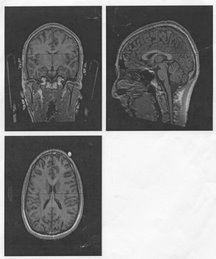My job since September has been as a companion to a 91 year old Alzheimer's patient two days a week. While mentally it has its challenges, the actual tasks are not difficult. I drive, cook, and entertain, on a very structured routine as order and repetition become substitute for short term memory. A typical day looks like this: Arrive at 10am, help with simple chores around the house and drive to the gym; set up the exercise equipment and facilitate the workout routine; return home and make lunch- two eggs/one yoke, a slice of lunch meat, one slice of toast, a cup of instant coffee with milk, a small glass of water, and a piece of danish. I have become an expert at making eggs scrambled, sunny side up, or medium boiled. After lunch is time for a rest on the sun room patio while I clean up the kitchen, followed by a trip to Laguna Beach to walk the board walk and watch the volleyball players. Thursdays my companion takes a community college emeritus course, Finance and Investments.
Due to the rigidity of this routine, variations have tended to catch me off guard. For instance, early in March, I had to re-introduce myself because my companion had forgotten who I was. While this incident should not have been a surprise, it was impactful because of its incongruence. Generally, tasks get easier with experience and I had come to work that Tuesday in March with the assumption I was now an expert caregiver....just to come to the immediate realization that to my companion, I was a new person back at day one. On another occasion, as we were preparing to go to the beach, my companion stepped into the restroom. For most of us, going pee is not a chore, but when you're 91, everything is time consuming. Fortunately, he is still continent so managing bodily functions is just a matter of time and patience. Several minutes later after returning from the commode he asked me a simple question, "What is the history of Toilet Paper?" Caught johnny-on-the-spot, again I found myself in a situation where my college degree and months of experience as a caregiver failed. Being the creative minded person that I am, I excreted the first answer that came to mind: "I don't know!"
I am relieved to say that next time I am in a similar situation, I will be more prepared! TP as it is commonly known has a long, distinguished history dating back to the 14th century Chinese Emperors, while the common toilet paper roll as we know it today wasn't invented until the 1880s. The Sears Catalogue and the Farmer's almanac were earlier ancestors to the TP roll in America. The Albany Perforated Wrapping Paper Company and Scotts were were the first companies to market toilet paper rolls but Scotts did not want their name associated with such taboo an item. Instead they marketed TP under the name Waldorf, after the hotel and main client of the miracle paper. Two ply paper followed in 1942, a British invention. As an FYI, the average American uses 20,805 sheets of toilet paper a year.
Alzheimer's Disease is a cruel thief of the things most valuable to an individual- their memories. And without rationalizing this disease, I can say that my time with Nat has helped me to look at each day anew, despite its routine framework and to value curiosity. It would be crappy indeed if I was to use another 20,805 sheets of toilet paper without thought, taking my luxuries and memories for granted.
For more on the history of TP, visit the virtual toilet paper museum
http://nobodys-perfect.com/vtpm/index.html.
Saturday, April 7, 2007
Subscribe to:
Post Comments (Atom)

No comments:
Post a Comment